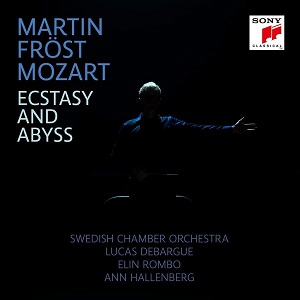
Wolfgang Amadeus Mozart (1756-1791)
Ecstasy and Abyss
Symphony No 38 Prague K504
Symphony No 41 Jupiter K551
Piano Concerto No 25 K503
Clarinet Concerto K622
Concert aria “Ch’io mi scordi di te?” K505
“Parto ma tu ben mio” from La Clemenza did Tito K 621
Elin Rombo (soprano)
Ann Hallenberg (mezzo-soprano)
Lucas Debargue (piano)
Swedish Chamber Orchestra/Martin Fröst (clarinet)
rec. 2021, various locations
Sony Classical 19658772252 [2 CDs: 139]
A first glance at this disc’s cover might tempt the listener to put it into the same sort of bracket as Leif Ove Andsnes’ ongoing Mozart Momentum project, with its Delphic title and its reference to years and location (Leipzig 1789, Prague 1791). In reality, it’s rather different, however. It feels a lot more self-contained rather than initiating a series, for one thing, and it’s something of a mixed success.
Martin Fröst both plays his clarinet and conducts in this pair of discs, thus showcasing his gifts across a range of fields. We’ll come to his clarinet playing in a minute, but first let’s deal with the weakest component of the discs: a maddening performance of the Jupiter symphony. That isn’t thanks to the playing of the Swedish Chamber Orchestra, which is lithe and full of action throughout, with good recorded sound. It’s more that Fröst’s conducting is bizarrely interventionist throughout, as though he can’t leave well enough alone, or he doesn’t trust Mozart to do the work himself. Tempi are fast, and there is a boundless sense of energy to the opening movement. However, there is an inordinate quantity of diminuendos, crescendos and cheeky pauses that disrupt the flow and get in the way of Mozart’s heavenly musical argument. This is at its worst in the slow movement, which repeatedly uses a very irritating sforzando effect which ruins the movement’s gorgeous poetry. It’s exaggerated and distracting, and elsewhere Fröst’s take on the music becomes a tiring listen after a while. The Prague symphony is better, with a slightly brusque introduction leading to a lively Allegro, though here too the cheeky pauses and distractingly unnecessary legato passages intrude. The slow movement proceeds with a more natural sense of flow, however, and the finale is lithe and exciting.
Elsewhere things improve. This is Fröst’s third recording of the Clarinet Concerto, a fact he justifies in an unnecessarily roundabout way in the CD booklet. I’ve only heard his 2010 performance (review) which I loved. This new one is noticeably more playful, especially in its outer movements. The first movement, in particular, is much more lively in its ornamentations and curlicues. The Adagio is faster than many will enjoy, so that there’s little space to wallow in its beauty, but its padding final phrases disappear beautifully, something helped by the fact that, as previously, Fröst plays a basset clarinet.
Fröst also plays the obligatto in the aria from La Clemenza di Tito, and here more than ever it feels like a duet with the mezzo as the twin lines curl around one another, though Ann Hallenberg is slightly smaller of voice than is ideal. The concert aria Ch’io mi scorda di te is even finer, thanks to the beautifully observed piano line of Lucas Debargue which entwines itself wonderfully with Elin Rombo’s pure soprano sound. Debargue is very good in the piano concerto, too. His piano is forthright and appropriately majestic, but it fits in very effectively with the sound that Fröst gets from the orchestra, creating a sound that’s bracing and fresh.
Fröst’s programme revolves around a concert that Mozart put on in Leipzig in 1789 and, less convincingly, some music that was enjoyed by audiences in Prague in 1791. That programme gives it a certain USP but, conversely, means it’s unlikely to find a widespread general audience outside of Fröst fans. Why buy this very particular combination, after all, when there are so many wonderful recordings of the symphonies and concertos elsewhere? That, combined with the maddening inconsistencies of the Jupiter performance, means it can’t be generally recommended warmly, but if you’re one of those Fröst superfans then you’ll still want to explore it.
Simon Thompson
Help us financially by purchasing from





















